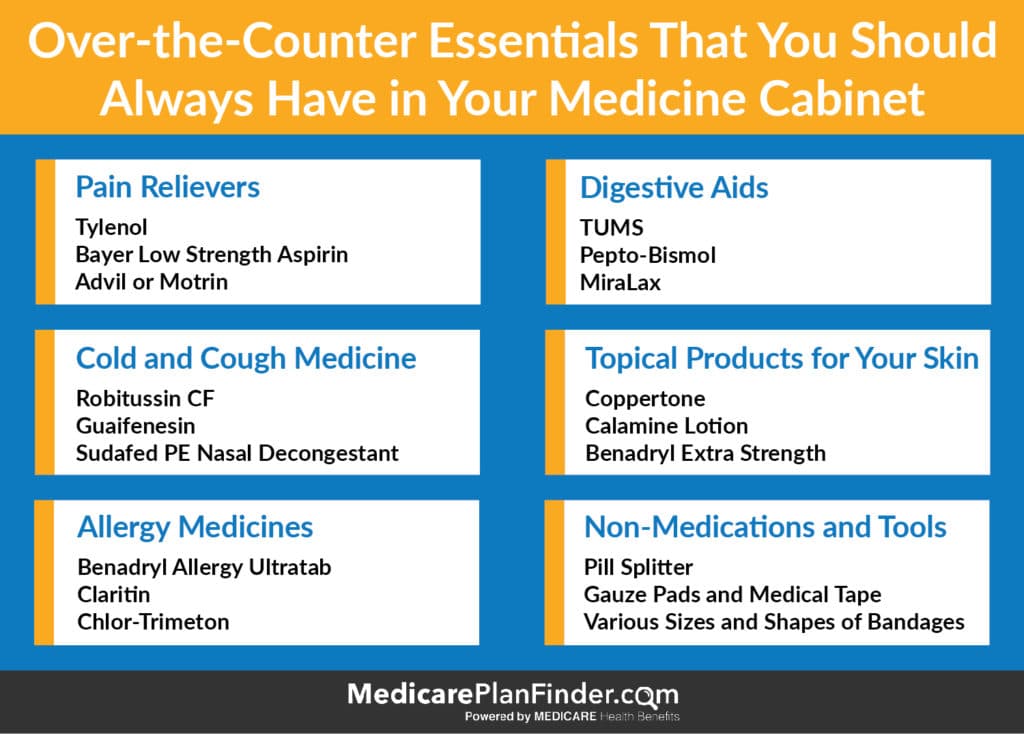OTC Essentials You Need in Your Medicine Cabinet
Millions of people use over-the-counter (OTC) products to help ease back pain, fight the common cold, and reduce fevers every day. Many healthcare providers trust OTC medications as a first treatment option for some conditions.
Most people think of medications such as pain relievers and cold medicines when they think of OTC essentials, but they may not think of items such as pill splitters and sunscreen. All of the above can be considered essential OTC items that you should keep in your medicine cabinet at all times.
Remember to speak to your doctor about possible side effects, and keep in mind that not all of these products will work for every person.
What OTC Essentials Should Go in My Medicine Cabinet?
Stock your medicine cabinet with products that can help treat a variety of ailments. You should be able to reach into your medicine cabinet and find something to relieve your symptoms rather than have to run to the pharmacy every time you have an ache or pain.
Always check with your doctor or pharmacist before buying an OTC product. Certain products may interact with your current prescription drugs, and you could end up harming yourself.
Pain Relievers and Fever Reducers
Pain relievers are among the most-purchased OTC products. They can help lower your body temperature if you have a fever and reduce inflammation.
Aspirin: This effective pain reliever and fever reducer has been popular for over a century. Aspirin is a non-steroidal anti-inflammatory drug (NSAID). Some people may find that it irritates their stomach, so many doctors recommend that you take it with food. Even though aspirin is a great addition to your medicine cabinet, it can interfere with blood clotting. If you take blood thinners or you’re about to have surgery, you should avoid aspirin.
Acetaminophen (Tylenol): This pain reliever works differently than NSAIDs. Acetaminophen does not affect inflammation. If you want or need to avoid aspirin, acetaminophen may be a better choice. Ask your doctor how much to take because you can damage your liver if your dosage is too high. Many cold and cough medicines also contain acetaminophen, so if you’re in doubt, check in with your doctor or pharmacist.
Ibuprofen (Advil and Motrin) or Naproxen Sodium (Aleve): These pain relievers are also NSAIDs. They are great for reducing inflammation-related pains such as headaches, arthritis-related joint pain, and muscle pains. Some doctors even prescribe these NSAIDs as post-surgery painkillers. These drugs can also help reduce fevers, making them an important addition to any medicine cabinet.
Cold and Cough Medicine
Colds and coughs are among the most common winter weather illnesses, and they’re highly contagious. If you stock your medicine cabinet with effective cold and cough medicine, you not only help yourself, but you help everyone around you.
Decongestants: These medicines are OTC essentials that can help you breathe easier. Pseudoephedrine (Sudafed) or phenylephrine (Dristan Cold Multi-Symptom and Rynatan) can help clear your airways while your immune system fights off your cold. Note that federal law limits how much pseudoephedrine you can buy per month.
Cough Medicine: You need different cough medicines depending on your type of cough. A dry, hacking cough is best suppressed with dextromethorphan. Robitussin Maximum Strength Cough and Pertussin both contain this cough suppressant.
If you have a mucusy cough, use an expectorant such as guaifenesin to loosen secretions. Brand name products that have guaifenesin include Robitussin PE and Benylin Expectorant Formula.

Allergy Medicines
These medications are great to have on hand during your allergy season, whether it be spring, summer or fall. If you have allergies, many OTC products can help relieve the most common allergy symptoms.
Antihistamines: Diphenhydramine (in Benadryl), chlorpheniramine (in Chlor-Trimeton), and clemastine (in Tavist Allergy 12 Hour Relief) all help relieve sneezing and runny noses. Be cautious with these medications because they all can cause sleepiness. If you need to be alert, look for products with loratadine such as Claritin, because they are not sedating.
Eyedrops: Drops that contain an antihistamine and a decongestant, such as Naphcon A and Opcon-A, can help soothe watery and itchy eyes.
Digestive Aids
Pink Bismuth: You can relieve a multitude of digestive issues such as nausea, indigestion, and diarrhea with pink bismuth (Pepto Bismol).
Calcium carbonate tablets: Tums and Rolaids can both relieve heartburn, which is when stomach acid backs up and irritates your throat. They work by temporarily neutralizing stomach acid. As a bonus, they provide supplemental calcium, which may be deficient in many people’s diets.
Maalox or Mylanta: Are heartburn relief products that may be longer-lasting than calcium carbonate tablets.
Fiber-Based Products for Constipation: OTC essentials such as Metamucil can help treat constipation. Your body is much less likely to become dependent on fiber-based products than laxatives such as Miralax. If you do use laxatives, be sure to only use them on rare occasions.
Topical Products for Your Skin
These items can help make your life easier, safer, or both. You can purchase them at any major drug store.
First Aid Supplies: Your medicine cabinet should include bandages, gauze, and medical tape. These items will keep dirt, dust, and debris from hindering your body’s ability to heal minor cuts and scrapes.
Pill Splitter: Sometimes you need to cut OTC or prescription drugs in half, and a pill splitter is an easy-to-use tool that can help. Whether your pill is too big for you to take or your doctor recommends splitting your dose, your pill splitter will be a welcomed addition to your medicine cabinet.
Pill Organizer: It can be difficult to remember when to take your pills, or if you’ve already taken them. A pill organizer is a handy tool that can separate your pills by when you should take them. Pill organizers usually have different compartments labeled with each day of the week. This makes it easy to know when to take your prescriptions, especially if you’re supposed to take them on a specific day of the week, or every other day, for example.
Textured Bath Mat: Many slips, trips, and falls happen in the bathroom every year. It’s understandable: the floors can be slippery. Use a bath mat with a textured grip to help you get a secure footing and reduce your chance of injury.
Medicine Cabinet Checklist
Use this medicine cabinet checklist as an inventory starting point when stocking essential OTC items. The checklist should only be a guide. Always ask your doctor before you purchase any new OTC medications.

Where to Purchase Over-the-Counter Essentials
You can find many of the over-the-counter essentials for your medicine cabinet at the following stores?
Online Stores for Over-the-Counter Essentials
Many of the stores listed above have a mail-order feature so you don’t have to leave your house when you need OTC products. You may be able to find your favorite OTC items at the following online pharmacies*:
*This is not a complete list of online pharmacies.
A Medicare Advantage Plan With OTC Coverage Can Help Pay for Your OTC Essentials
If you’re eligible for Medicare, you may wonder, “Does Medicare cover OTC drugs?” Original Medicare does not cover OTC drugs. However, certain private insurance plans called Medicare Advantage (MA) plans can offer OTC coverage. Some MA plans offer other additional services such as vision, dental, hearing, and even fitness classes!
A licensed agent with Medicare Plan Finder can help find the right MA plan for your budget and lifestyle. Call 844-431-1832 or contact us here to learn more.

This post was originally published on July 26, 2019, and updated on November 19, 2019.






